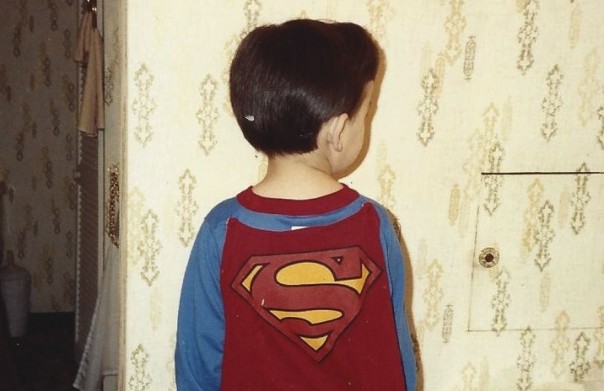Before Batman was my favorite superhero, I pledged my allegiance to Superman. It's offensive to my enlightened mind now, but when I was five...forget about it. Superman was the best. I wore towel-capes and Superman outfits everywhere. To my mother's horror, I would find a way to jump off everything I could in attempt to fly: the couches, the tables, the piano, and over the railing of the stairs.
My superhero sensibilities eventually matured (and yes, I'm fully aware that my choice of the word "mature" is saturated in and dripping with irony). You know what made me grow weary of Superman? He was too perfect. Sure, the kryptonite was a glaring (and annoying) weakness, but come on. The guy is indestructible. He's super strong. He can fly. He can reverse time by flying around Earth super fast and changing its direction. Anyone who is a scientist can allow for a certain suspension of disbelief in comic books and movies, but reversing the rotation of Earth to turn back time? Come on, man. That doesn't even...never mind.
On the other hand, consider a hero like Batman: human. Mortal. Vulnerable. He bleeds. He's an orphan, a tortured soul.
That's a guy I can relate with. And just as my taste in superheroes changed, so has what I've come to appreciate in people I respect.
I've become less and less impressed with any "hero," any leader, any role model who seems too perfect. You know them. You've seen them. Always strong, always virtuous, always impenetrable.
The problem is that I've watched way too many of them fall. I've seen their flawless statues crumble. Their glossy coats of paint flake and chip to reveal the brittle, rusted shell underneath. We don't live in a universe with a Superman. This is real life. And in real life, even the best of us can only hope to be a Batman--flawed and vulnerable with maybe enough smarts, gadgets, and tricks to make up for our shortcomings.
I bring this up because I was talking to a friend last week about everything I'm processing in my life right now (which is far from perfect, by the way.). At one point, he mentioned having "the freedom to grieve."
The freedom to grieve.
Those words struck me like flint on steel. There's a battle constantly raging inside me--I have the desire to be vulnerable, to live my life free and open, to be human. But I also have an almost involuntary compulsion to try to be Superman. To not bend under pressure. To brush away bullets like harmless gnats. To have buildings collapse on me and raise myself up from the rubble, unfazed.
One of the ways I do this is by plowing forward with a Superman schedule. It's been so easy for me to distract myself from grieving the pain of some things in my life. I have a full-time job, teaching, that demands that I put on a brave face, that requires me to concern myself with the struggles and problems of 114 students, that demands even more from me than the eight hours I spend in the building. I have another job at the church. I have two graduate classes I take at night. I'm in a volleyball league. I write. I read. I connect with friends. Oh, and there's that thing, the internet. (Why is YouTube so great and so terrible for me at the same time?)
No time to stop. No time to slow down. No time to notice the damage. I've tried to blaze through the trials of my life like a super-human when in fact I'm a frail, vulnerable, and mortal being. I sometimes overvalue the virtue of strength. Or, more accurately, the appearance of strength.
I pretend that the bullets have bounced off, and I keep marching. It's not until later that I discover that I'm bleeding; the bullets have buried themselves in my body.
I usually try to find my strength in appearing to be strong. I don't think that's where strength comes from, though.
True strength isn't found in bravado or a denial of weakness. It's not declaring invincibility to being shaken or rattled, wounded or crippled. True strength is when we can own up to our vulnerability before our false sense of confidence sinks us. It recognizes our need for the cyclical nature of human pain and recovery, much like our muscles when we exercise. We exert stress and strain on our muscles, and they tear. Then they need rest, and when they have repaired themselves, they are stronger than before.
When we fall, we need to grieve our pain, and then we can start to heal, to mend ourselves, to stand up out of the rubble and move forward. And ultimately, we'll be stronger than before.
I'm not even sure what grieving looks like for me. But I'll start fumbling with the process by saying this:
I am not Superman. I'm not as strong as I thought I was or pretend to be. I can't carry the world on my shoulders. I've absorbed a lot of hits in the last few years, and I'm now noticing the wounds and the broken bones I've accumulated. And it's okay that I have them.
Even the simple act of writing those words is freeing.
Surprisingly, it feels much better to be human than it does to be super-human.
